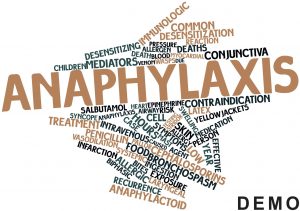 Anaphylaxis is a serious allergic response that often involves swelling, urticaria, and lowered blood pressure and in severe cases shock.
Anaphylaxis is a serious allergic response that often involves swelling, urticaria, and lowered blood pressure and in severe cases shock.
“Allergist Services” is experienced in treating Anaphylaxis. Anaphylaxis may occur in people with allergies to foods, insect stings, medications or latex.
When you are allergic to anything, the reaction of your immune system is to release chemicals in your body which cause you to experience the typical signs, such as: itchy, watery eyes and runny nose. Anaphylaxis symptoms include:
- Skin reactions, including hives along with itching and flushed or pale skin
- The sensation of a lump in your throat
- A feeling of warmth
- A weak and rapid pulse
- Dizziness or fainting
- Wheezing and trouble breathing
- Nausea, vomiting or diarrhea
Anaphylaxis that is triggered by exercise is not a typical reaction and differs from one person to another. For some, aerobic activity, such as jogging, may trigger anaphylaxis. In other people, far less strenuous activity, such as walking, may cause a reaction.
Consuming certain foods prior to exercising or exercising during hot, cold or humid weather has also been connected to anaphylaxis in some individuals. Anaphylaxis symptoms usually include any or all of the following parts of your body: the skin, mouth, eyes, lungs, heart, gut and brain.
During an anaphylactic attack, the emergency medical team may perform cardiopulmonary resuscitation (CPR) if you stop breathing or your heart stops beating. You may be given medications including:
- Epinephrine (adrenaline) to reduce your body’s allergic response
- Intravenous (IV) antihistamines and cortisone to reduce inflammation of your air passages and improve breathing
- Oxygen, to help compensate for restricted breathing
- A beta-agonist to relieve breathing symptoms
When you have a child who experiences anaphylaxis, it’s important to know very clearly how to care for your child. Your doctor will provide you with very detailed steps for how to properly care for the child in an emergency situation. It’s very important than anyone involved in caring for your child is very cognizant of the signs and symptoms of anaphylaxis and how to properly treat it.
Typically, Epinephrine is administered to a patient who is in anaphylaxis. The plan from your doctor will explain how and when to deliver the epinephrine. Antihistamines cannot be relied up to treat anaphylaxis.
Contact us for more information at (561) 123-1234.

